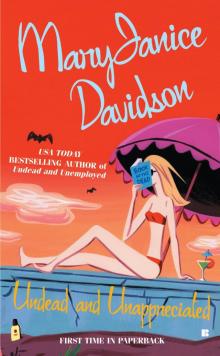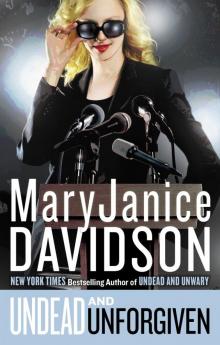- Home
- MaryJanice Davidson
Fish Out of Water Page 12
Fish Out of Water Read online
Page 12
And then the lovely Dr. Bimm ripped him a new asshole.
“Yeah, well, Captain, we don’t all run our empty, meaningless lives by a clock. Some of us, Captain, have families and loved ones to think about and those loved ones often throw wrenches into our schedules. Some of us, Captain, have entire kingdoms to worry about, as opposed to spending all of our time, hmm, I dunno, ignoring our only son.”
The boy’s eyes actually bulged. “Jesus, Fred!”
The captain laughed. And laughed. And finally had to sit down and hold his sides, because they ached so from such unaccustomed glee.
Thirty-eight
Fred eyed Thomas’s father with thinly veiled suspicion. He looked like a typical military hard-ass, and from the moment she saw him she could guess how it had been between Captain Kick-ass and a son who had no interest in a military career.
Correction: a son who wrote romance novels and had no interest in a military career.
It made her ashamed for how much she took Moon and Sam for granted . . . for her occasional embarrassment at their hippie ways. Well, Moon would have lit herself on fire before trying to direct Fred’s choice of career. Fred could have turned tricks and Moon never, ever would have cut off contact.
Funny. Funny to think that Moon and Sam had protested at Vietnam rallies in the sixties. Trying to end the war. Trying to get men like Pearson out of the jungle and back with his family.
Men like Pearson, who would have sneered at Moon’s bell-bottoms and Sam’s beard. Who would have called them fools for loving peace more than loving serving their country.
Yes, she could guess how it had been. It made her admire Thomas all the more for sticking to his choice, for denying his father’s wishes and going his own way.
It was just another version of stage mothering, that’s what it was. Or fathers pushing their sons into football so they could relive their long-gone glory days.
In a phrase, irritating beyond belief. She recalled a line from one of her favorite novels, The Prince of Tides. “Fuck the fathers. They should know better.”
And wasn’t that the truth.
Still. She could have chosen her words with a little more care. It was too bad she’d lost her temper a little.
Well. A lot.
And then he’d laughed. And laughed. And laughed!
So now Fred had no idea what to think, and she didn’t like the feeling one bit. She didn’t even know she was going to say it until it was out. And, like so many other things she said, once it was out, there was no taking it back.
There were so many things, she thought, staring at her now-present fiancé, you couldn’t take back.
She couldn’t deny it felt good to stick it to the old man—the thought of this guy not appreciating someone as wonderful as Thomas was fucking infuriating—but realized instantly that she’d antagonized their only source of military intelligence.
Amazingly, he hadn’t minded.
Weird.
Really quite weird.
And then Artur had arrived, and she had to focus on the matter at hand.
The captain, to his credit, shook hands with Artur while looking him straight in the eye and not looking over-awed, as most people did when they met the imposing prince. They’d all had a seat at the big dining-room table.
Jonas had made coffee, put out platters of scrambled eggs and toast and jars of jelly, and had sat unobtrusively at the end of the table (most unusual!).
“Good sir, I am grateful you have come.” Artur, who loved surface-dweller food, had a pile of scrambled eggs on his plate that resembled a yellow pyramid, three pieces of toast, and two cups of coffee. “My king has a problem and we need your assistance.”
The captain, sitting ramrod straight in his chair (his spine didn’t even touch the back!), nodded. He took a sip of his coffee and replied, “So my son implied. What’s the trouble?”
Artur laid it out, quickly and precisely. The captain’s eyebrows arched a few times (and how he looked like Thomas when he did that!) but he seemed to readily accept telepathy, missing Undersea Folk, the king’s astonishing telepathic range, and how he and Artur discovered the problem. Fred was slightly amazed.
“I do not mean to impugn your honor by implying your government may be involved,” Artur said carefully, “especially as Thomas has explained to me what a great warrior you were for your people.”
Again with the eyebrow arch. Another glance at Thomas. And Thomas shrugged, something he was doing a lot with his father around. He was hardly saying anything at all—major-league unusual.
“But perhaps you may have some ideas about where we may look. Or perhaps you may strongly feel we are going in the wrong direction and can share that with us so we waste no more of your time. My people, and my father, would be grateful for any assistance you can give us, in whatever form that may be.”
The captain smiled. It did amazing things to his craggy face: the years fell away. He had the same dimple Thomas did. His eyes, arctic blue, actually seemed to thaw. “Prince Artur, you will be an excellent king. I’ve rarely heard such potentially dangerous questions posed so diplomatically.”
Artur inclined his head.
“You should see him juggle bowling pins,” Jonas piped up from the end of the table, chomping on toast slathered with roughly an inch and a half of jelly.
Fred smirked in his direction.
“But I’m afraid our government would never, and has never, had anything to do with kidnapping, unlawfully detaining, or killing any of your people.”
“Not the good people who brought us Fat Man and Little Boy,” Fred said mockingly. “Or Agent Orange, the nuclear submarine, Japanese-American internment camps, the Thompson submachine gun, the long-range bomber, land-based ballistic missiles, or the B-52.”
Thomas was actually covering his eyes. “Fred,” he groaned.
Fred couldn’t have stopped if someone had stuck a gun in her ear. “Of course the government isn’t up to no good. Perish the thought!”
The captain quirked an eyebrow at her and the corner of his mouth turned up. “Why do you hate America, Dr. Bimm?” he asked pleasantly.
She threw her hands up in the air. “Oh, don’t even start with that crap, Captain!”
“You look about the same age as my son. Hmmm. Let me guess: your parents were hippies? Antimilitary? Vietnam War protesters?”
“Are hippies,” she corrected. “And yes. And yes.”
“In other words, they were free to protest their government’s actions because the military secured that freedom for them.”
“Children,” Jonas said around a mouthful of eggs. “Play nice.”
“Quite right, Jonas.”
“Sorry,” Fred muttered.
“Quite all right, Dr. Bimm. As I was saying, my government has not harmed or unlawfully detained any Undersea Folk. Not for military applications, not for border skirmishes, not for money, not for oil. Not for anything. I regret the loss of your people, but my government is blameless.”
“I see.” Artur was silent for a moment. “I am sorry to have wasted your time, Captain.”
“It was no trouble. I was glad for the chance to see my boy again.”
Thomas choked on his coffee. Fred had to pat him on the back when his face turned an alarming shade of purple.
“And, of course, I made a stop yesterday to visit some cronies at Sanibel Station—the naval base they have just down the road?”
“Sanibel Station?” Fred repeated, startled.
“There’s a naval base on this teeny island?” Jonas asked.
Fred had no idea how to answer him. The navy often allowed marine biologists (or consulted with them) on various projects, and so Fred and Thomas, during their years of education and fieldwork, both had a working knowledge of most naval bases in the country.
And Thomas, of course, was the son of a naval officer. From the look on his face, he’d never heard of Sanibel Station, either.
“Well, perhaps I’m mistaken.” T
he captain shrugged. “I’m getting old. My memory isn’t what it used to be.”
Thomas snorted into his coffee.
“Perhaps it’s called something else. Or perhaps it’s somewhere else. But regardless, it was nice to talk to some old friends. One of them—” The captain laughed, a freeing, joyful sound. “He’s a sentimental idiot.”
“That’s . . .” Fred paused. “So sweet.”
“Oh, he’s always talking about how I carried him on my back through ninety yards of rice paddies to the chopper pickup. What crap! I keep telling him he’s got the wrong guy. On paper, I was sixty miles away. That’s what my orders said, anyway.” He shook his head, still snorting laughter. “Like I said, he’s an idiot. But it was nice to talk to him, all the same. Trading war stories. Finding out what former squad members have been up to. Silly old man stuff.” Pause. “And it was very nice to see my son.”
Thomas was staring at his father as if the man had sprouted a bathtub faucet from his forehead. For that matter, so was Fred.
The captain stood. Artur and Thomas stood. Fred and Jonas remained seated, Jonas because he was still chomping away, and Fred because her brain was working furiously to figure out just what the hell was going on.
“It was nice to meet you, Prince Artur.”
“And you, Captain Pearson. I see now where Thomas gets his warrior spirit.”
The captain shook his head. “No. He’s his mother’s son. For which I thank God every night.” They shook hands, surface-dweller style.
Fred had to stand up and smack Jonas on the back. He really ought to stop eating until the captain left, she thought.
“Good to see you, son.”
“You, too, sir.” Thomas stuck out his hand.
And the captain put a fat file folder in it, with CLASSIFIED and EYES ONLY and PROJECT JAMMER stamped all over it in red.
Then he smiled.
Hugged his son (who was standing, frozen, and Fred feared he would drop the folder, or faint, or both).
Left.
Thirty-nine
“Uh,” Jonas said. “What just happened?”
Thomas had dropped the folder on the table and started to sit. If Fred hadn’t shoved the chair over, he would have landed splat on the floor. They were all staring at it.
Bulging with papers.
EYES ONLY.
CLASSIFIED.
“I can’t believe he did that,” Thomas murmured.
“I know!” Fred said, wide-eyed. “If it gets out that he gave us this, it’ll be his ass!”
“I meant hugging me.”
“Also extremely shocking. And just when I’d made up my mind that your dad was a dick.”
“Fredrika,” Artur reproved. “Do not speak so of such a warrior.”
“Have you actually met me, Artur? For God’s sake. So. Thomas, your dad made this happen.” She pushed the folder over to him. “Why don’t you do the honors?”
After a few seconds, he flipped open the folder. Passed chunks of paperwork around (the thing was two inches thick; it would have taken one person a week and a half to get through it).
They began to read.
Forty
King Mekkam came through the door. He didn’t knock and get invited in. He didn’t open it and walk through. He burst through the door and chunks of wood went flying everywhere.
Fred groaned, mentally kissing her security deposit good-bye.
“I came at once, my son.”
“We noticed,” Jonas said, big-eyed.
“What is so urgent? Are you all right?”
King Mekkam looked like a slightly older, grayer version of Artur. They were even the same height. And, though the man was over a century old, he had the broad chest and shoulders of a lumberjack. His ruby-colored eyes glittered and he carried himself with an aloof dignity that proclaimed his royal blood far more efficiently than something so silly as a crown.
“We have had a fascinating visit from Thomas’s sire,” Artur replied.
“Fascinating isn’t the word,” Thomas muttered, rubbing his temples as if he were getting a headache. “Surreal. Twilight Zone-esque. In fact, it’s possible that was an alien robot and not my father at all.”
“You’d better have a seat, Mekkam,” Fred said. “We’ve got lots of stuff to tell you.”
The frown lines on his forehead disappeared and he smiled. “Fredrika!”
“You, uh, sound surprised to see me.”
Mekkam shook his head, clasped her hands, then raised them to his mouth and kissed them. “I have not had an opportunity to tell you how very pleased I am that you are joining my family. I look forward to your mating ceremony and to many pups.”
“Pups?” Jonas repeated. “Oh, God. This is too good. Pups?”
“They call being pregnant ‘in pup,’ ” Fred explained, resisting the urge to strangle her friend. “So I’m guessing mer-babies are pups.”
Jonas laughed harder.
“I hate you,” Fred commented. “So much.”
“But now, back to the matter at hand. What have you learned?”
They had reassembled the file and showed it to the king.
“What is Project Jammer?”
“It seems you have a few traitors in your midst, Mekkam,” Thomas said heavily. “Some Undersea Folk apparently sought out a clandestine branch of the navy, a base called Sanibel Station that hardly anyone in the navy knows about. I imagine it’s their version of Black Ops.”
“Black Ops?” King Mekkam asked.
“It’s usually a secret branch of the military, secret because there’s often a question of ethics or legality involved,” Thomas explained. “Our governments aren’t supposed to send assassins or perform non-FDA-REGULATED experiments or think up new bioweapons or stuff like that, but of course they do. Everyone’s government does. Black Ops exist so the government of whatever country is running the team has total deniability.”
“Lots of sneaky stuff gets done that way,” Fred added. “Among other things, research into unconventional warfare.”
“Like telepathy,” Jonas said.
Mekkam was silent. Then, “My . . . my people? Have done this? Gone to your military and . . . what, precisely?”
“Shown them what they can do, telepathically. Given them tissue samples. Submitted to experiments.”
“But . . .” Mekkam looked so devastated, so horrified, Fred could hardly look at him. “Why?”
“So the navy could help them increase their telepathy,” Thomas said, very quietly.
“You mean the people who disappeared . . . they did so . . . willingly? They allowed themselves to—” The king paused. Then a large fist slammed onto the table, which obligingly cracked. Everyone pushed their chairs back, but it only cracked down the middle; for the moment, it held together. “Then they are planning something. They are—” Shocked, he looked at Fred. “We were wrong. It isn’t your father.”
“No,” Fred admitted, making no effort to hide her relief. “But it’s probably some or all of the youngsters who sided with him during the coup. The ones who weren’t banished, who apologized and made nice with everyone and pretended Farrem led them astray.”
“And like a fool, I believed them!”
This time, the table broke under the blow. Fortunately, Jonas had cleared all the dishes while they were waiting for Mekkam to arrive.
“They probably meant it at the time,” Jonas suggested, nervously eyeing the eight-foot table, now two four-foot tables. “So why wouldn’t you have believed them? But after a while, they probably got to thinking . . . wondering if things could be different . . . and I’m betting you’re not the kind of guy who spies on his people’s thoughts just for funzies. So how could you have known?”
“No, no, I would never—” Mekkam sounded furious and bewildered, a frightening combination to watch. “I merely—I mean I don’t spy on them like a filthy—”
“Mekkam, there’s no way you could have seen this coming,” Fred said gently. “You got ri
d of the problem. The youngsters apologized. Nobody talked about Farrem anymore. That was that . . . for years and years.”
“But why now? Why would they start disappearing from my mind in the last six months?”
“That’s what we haven’t been able to figure out,” Thomas admitted. “Some of this report is pretty dense, and there are charts that Fred and I have to figure out. Some of it even appears to be in code. What we know so far is that some of your people have been working with the naval equivalent of a Black Ops team—probably a tit for tat.”
“Pardon?”
“In return for giving the navy brain tissue samples, for letting doctors run tests on them, for basically being guinea pigs so the navy—that one, small, secret branch of the navy—can help them increase their telepathy, they’ve probably been running missions for the government.”
“There’s no way any government would have turned them down,” Jonas added. “Fred warned you from the beginning that we, as a species, are incredibly nasty to anyone even slightly different. If the someone slightly different volunteers for, say, vivisection . . .”
“Now here come men and women who can breathe under water,” Thomas said. “They’re incredibly strong. They’re incredibly long-lived and they age unbelievably well. You could send a man out with seventy years of combat experience, and he’d get carded if he tried to buy booze. Good stamina. Incredible swimmers—they’re mermaids and mermen, for God’s sake. The stuff of legend. And best of all, most wonderful of all, they’re telepaths. And here comes a bunch of them willing to be experimented on if the navy will help them augment their innate abilities.” Thomas paused to let this sink in. “Jonas is right. There’s not a government on the planet who wouldn’t have jumped at the chance.”
“But why? Why do this?”
Fred paused. Surely the king knew. He was many things, none of them a fool. She put it down to shock. And she was sad for him. This was very likely a direct result of the Undersea Folk letting the world know they existed.
“Why try to make themselves stronger? Why disappear off your radar?” Thomas paused, then went on as gently as he could. “You’ve got another coup on your hands, Mekkam.”

 The Royal Treatment
The Royal Treatment Hello, Gorgeous!
Hello, Gorgeous! Undead and Unwed
Undead and Unwed Fish Out of Water
Fish Out of Water The World Is Too Darned Big
The World Is Too Darned Big Loves Prisoner
Loves Prisoner Dying for You
Dying for You Love Lies
Love Lies Really Unusual Bad Boys
Really Unusual Bad Boys The Royal Mess
The Royal Mess Dead Over Heels
Dead Over Heels Rise of the Poison Moon
Rise of the Poison Moon The Royal Pain
The Royal Pain You and I, Me and You
You and I, Me and You Jareds Wolf
Jareds Wolf Undead and Unwary
Undead and Unwary Sleeping With the Fishes
Sleeping With the Fishes Danger, Sweetheart
Danger, Sweetheart Me, Myself and Why?
Me, Myself and Why? Undead and Unfinished
Undead and Unfinished Deriks Bane
Deriks Bane Thief of Hearts
Thief of Hearts Undead and Unwelcome
Undead and Unwelcome Deja Who
Deja Who Deja New
Deja New Under Cover
Under Cover Undead and Unforgiven
Undead and Unforgiven Dead and Loving It
Dead and Loving It Undead and Unstable
Undead and Unstable Swimming Without a Net
Swimming Without a Net Undead and Underwater
Undead and Underwater Undead and Unappreciated
Undead and Unappreciated Undead and Unsure
Undead and Unsure Undead and Unworthy
Undead and Unworthy Wolf at the Door
Wolf at the Door Undead and Undermined
Undead and Undermined Undead and Unpopular
Undead and Unpopular Unwavering
Unwavering Doing It Right
Doing It Right Undead and Uneasy
Undead and Uneasy Drop Dead, Gorgeous!
Drop Dead, Gorgeous! Outta the Bag
Outta the Bag UNWAVERING: An Undead short story (Undead shorts Book 1)
UNWAVERING: An Undead short story (Undead shorts Book 1) Jennifer Scales and the Ancient Furnace
Jennifer Scales and the Ancient Furnace Yours, Mine, and Ours
Yours, Mine, and Ours Under Cover (v1.1)
Under Cover (v1.1) Jennifer Scales and the Messenger of Light
Jennifer Scales and the Messenger of Light Betsy 4 - Undead and Unreturnable
Betsy 4 - Undead and Unreturnable Sleeping with the Fishes (v1.1)
Sleeping with the Fishes (v1.1) betsy short 02 - ureliable
betsy short 02 - ureliable Evangelina
Evangelina Dead Over Heels (wyndham werewolf)
Dead Over Heels (wyndham werewolf) The Silver Moon Elm
The Silver Moon Elm Faeries Gone Wild
Faeries Gone Wild Surf's Up
Surf's Up Seraph of Sorrow
Seraph of Sorrow Demon's Delight
Demon's Delight